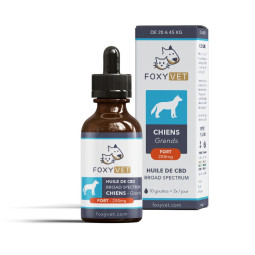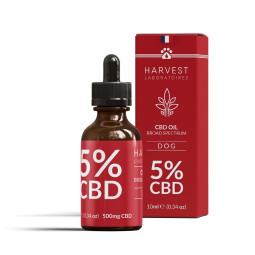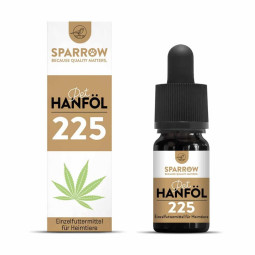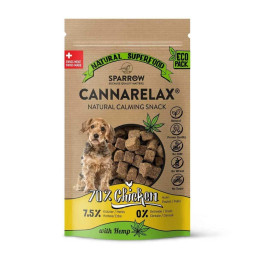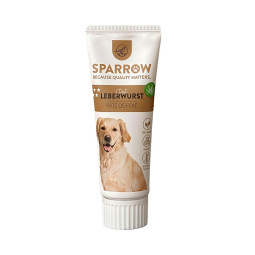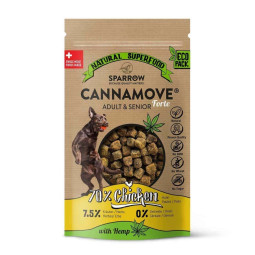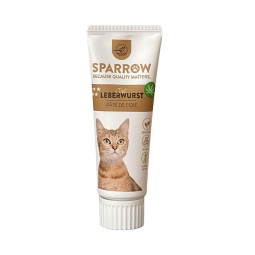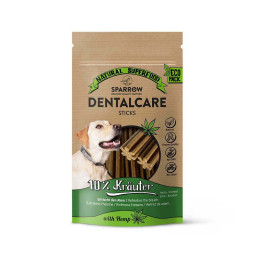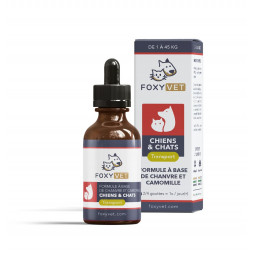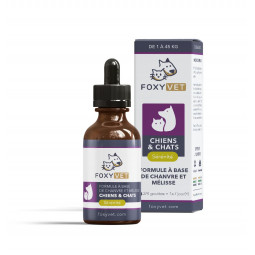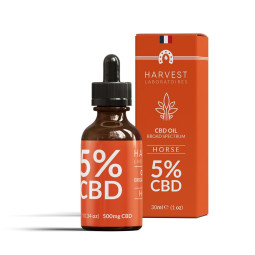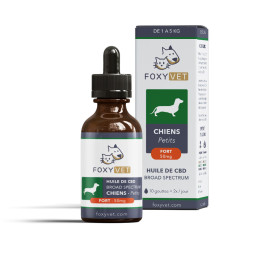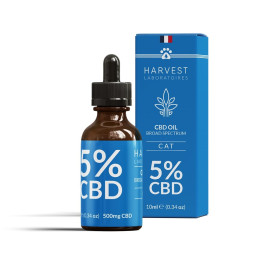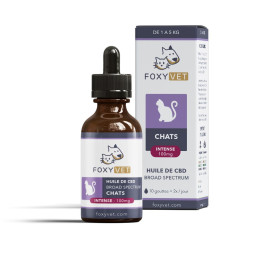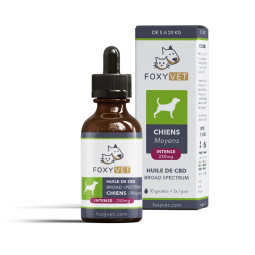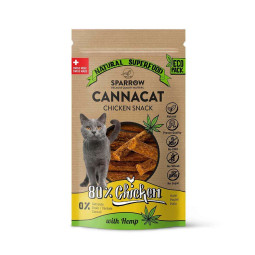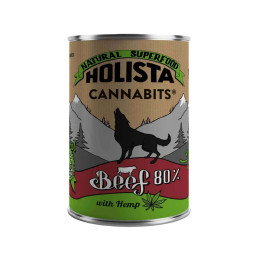Give your four-legged friends a better quality of life with CBD. Commonly used to manage pain in dogs and cats, CBD offers a natural, plant-based solution for your pet. Discover CBD oils specifically dosed for your pets, available in different flavors for greater acceptance. A natural support for their health and well-being.
Understanding CBD for pets
CBD, or cannabidiol, is a natural compound extracted from hemp that interacts with the mammalian endocannabinoid system. This biological system plays a key role in regulating numerous bodily functions, such as pain, anxiety and sleep. So, just as in humans, CBD can help regulate homeostasis in animals, by rebalancing their internal environment. This is why CBD can be used to help relieve a variety of ailments in our four-legged companions, from chronic pain to stress and anxiety.
The benefits of CBD for animals
Beyond its effects on pain and anxiety, CBD brings many other benefits to our pets. In particular, it boosts the immune system, helping our companions to fight off infection and disease more effectively. CBD's anti-inflammatory properties are also beneficial for animals suffering from osteoarthritis, helping to relieve pain and reduce joint inflammation. In addition, CBD can be a valuable ally in animal epilepsy, reducing the frequency of seizures. Finally, by acting on the receptors of the endocannabinoid system, CBD helps our animals fall asleep and improves their quality of sleep.
CBD for dogs: a natural soother
What do vets think?
More and more veterinarians are approving the use of CBD for dogs. These animal health professionals recommend it in particular to relieve osteoarthritis, epilepsy and anxiety.
- CBD is seen as a natural solution for improving the health of our four-legged friends.
- Some vets recommend its use for chronic pain and epilepsy.
- Others stress the importance of veterinary supervision to ensure the safety and efficacy of CBD.
However, the position of veterinarians is sometimes mixed, particularly in France where the use of this substance in the treatment of animals is not authorized.
Dog owner testimonials
Many dog owners have shared their positive experiences with administering CBD to their pets. In particular, they testify to CBD's effectiveness in managing various ailments and improving the well-being of their four-legged companions.
Lina, owner of Loki, a 15-year-old Jack Russel suffering from osteoarthritis and stress, shares: "I got Loki 15 years ago, when he belonged to a couple of vets who took him in. He was still a puppy at the time and had to be weaned earlier than expected. CBD helps him manage his osteoarthritis and stress."
Karin, owner of Emma, a pug with epilepsy, says: "While researching on the internet, I came across Nordic Oil and their CBD products. This treatment has made a noticeable difference to Emma."
Clotilde, owner of an 8-year-old hyperactive Jack Russel, says: "Pixel is quick to react to any noise or movement. Since I started giving him CBD, he's become calmer, while remaining the energetic playmate the kids love."
Dosage and use of CBD oil for dogs
AdministeringCBD oil to your dog should be done gradually, starting with a low dose. Generally, we recommend giving 0.2 to 0.5 mg of CBD per kilogram of body weight, twice a day. For a 30 kg dog, this is equivalent to 2-3 drops of 5% CBD twice a day.
You can adjust the dose according to the effect observed on your pet. If your dog seems to tolerate CBD well and you don't notice any improvement in his condition, you can gradually increase the dose. However, you should always consult a veterinarian before changing the dosage.
CBD oil can be administered directly into your dog's mouth or mixed into his food. The choice of administration method often depends on your pet's preferences. Some CBD oils are also available in different flavors to facilitate acceptance.
Therapeutic effects of CBD on canine osteoarthritis
Research indicates that CBD may be a viable treatment option for osteoarthritis in dogs. Thanks to its anti-inflammatory and analgesic properties, CBD can help reduce joint inflammation and relieve the pain associated with this disease. What's more, unlike other treatments such as anti-inflammatories and chondroprotectors, CBD has no notable side effects.
It has also been reported that CBD can improve mobility in dogs suffering from osteoarthritis, enabling them to maintain a better quality of life. Finally, some studies suggest that CBD may help remineralize bones, offering additional support to affected joints.
CBD for cats: a valuable daily aid
Is it safe to give your cat CBD?
CBD can benefit your cat through its interaction with the endocannabinoid system, common to all mammals. The effects of CBD on our felines can range from soothing and relaxing, to reducing epileptic seizures and improving mood and appetite.
However, it should be noted that research into its effects is still ongoing, and while feedback shows positive results, it is advisable to remain cautious and always consult a veterinarian before administration.
What's more, CBD doesn't bind directly to receptors, avoiding direct effects on your cat's behavior and perception, while still allowing him to benefit from CBD's therapeutic advantages.
How to dose CBD oil for cats?
Administering CBD oil to your cat also requires a cautious, gradual approach. The recommended dosage is generally 0.1 to 0.5 mg of CBD per kilogram of body weight, to be administered twice a day. For example, for a 5 kg cat, this equates to around 0.5 to 2.5 mg of CBD per dose. However, cats can be more sensitive to CBD, so it's advisable to start with the lowest dose and gradually adjust according to the animal's reaction. CBD oil can be given directly into the cat's mouth or mixed with its food.
Veterinarians' opinions on the use of CBD in cats
Veterinary opinions on the use of CBD in cats are generally positive. Indeed, more and more animal health professionals see CBD as a natural solution for relieving numerous ailments such as stress, joint pain and certain behavioral disorders. However, as with any substance, they recommend cautious, informed use. It is therefore advisable to always seek the advice of your veterinarian before administering CBD to your cat, particularly to determine the appropriate dosage.
Testimonials from cat owners
Many cat owners testify to the benefits of CBD on the health and well-being of their companions. Julie, owner of an elderly cat suffering from arthritis, shares: "Since I started giving him CBD, I've noticed a marked improvement in his mobility, and he seems to be in much less pain".
Similarly, Lucie, whose cat suffered from anxiety, reports: "My cat was constantly on the alert and found it hard to relax. Since introducing CBD, he's much more relaxed and seems less stressed".
What's more, some owners have observed a positive impact of CBD on their cat's appetite. As Alexandre says, "My cat had lost its appetite following an illness. Thanks to CBD, his appetite has returned and he has regained his energy".
These testimonials, though subjective, shed interesting light on the potential effects of CBD for cats.
Other pets and CBD
Apart from dogs and cats, other pets can also benefit from the effects of CBD. For example, horses and rabbits can also benefit from its soothing and anti-inflammatory properties. Birds and rodents, such as hamsters and gerbils, can also be positively affected by CBD.
However, each species has its own specificities, and the dose of CBD must be adjusted accordingly. It is therefore crucial to consult a veterinarian before administering CBD to your pet.
It should also be noted that further studies are needed to fully understand the efficacy and safety of CBD in these animals.
Legality and purchase of CBD for animals in France
In France, the purchase of CBD-based products is legal as long as the THC content remains below 0.3%. It is therefore perfectly possible to buy and administer CBD to your pets. However, you need to exercise caution and comply with certain regulations. For example, CBD-based food products must be assessed by the European Food Safety Authority (EFSA) before being marketed.
Where can I buy quality CBD for pets?
The quality of CBD for animals: what you need to know
The quality of CBD for pets is paramount to guarantee its efficacy and avoid undesirable side effects. Preference should be given to products based on pure CBD, without THC, as the latter is psychoactive and can be harmful to animals. Moreover, CBD must be extracted from hemp plants grown without pesticides or herbicides. The choice between full-spectrum CBD and CBD isolate depends on the animal's state of health and the advice of a veterinarian.
Product labeling is also an important indicator of quality. It must mention :
- CBD concentration,
- The possible presence of other cannabinoids,
- Ingredients used.
Finally, it's best to opt for products tested by third-party laboratories to guarantee the veracity of the information provided by the manufacturer.
Buying CBD for pets in France: is it legal?
In France, the purchase of CBD products for animals is legal as long as the THC content does not exceed 0.2%, in accordance with current cannabis regulations. However, it should be noted that the sale of food products containing CBD is currently considered illegal in France. It is therefore preferable to opt for forms of CBD not intended for ingestion, such as oils or balms. You should also opt for products tested by third-party laboratories to guarantee their quality and compliance with the law.
The different forms of CBD for animals available on the market
CBD oil for pets: presentation and use
CBD oil for pets is a popular form of this cannabinoid, easily administered thanks to its liquid format. It is generally extracted from hemp plants, guaranteeing a THC level of less than 0.2%, with no risk of toxicity for your pets.
CBD oil can be used for a variety of animal health concerns, such as improving general well-being, reducing stress and relieving chronic pain. It can also promote skin and coat health, and relieve itching or skin irritation.
For optimal use, CBD oil can be added to the animal's food or administered directly into its mouth. It is recommended to start with a low dose, then gradually adjust according to the effects observed. Finally, it is crucial to always respect the recommended dosage according to the animal's weight.
CBD paste for pets: advantages and disadvantages
CBD paste for animals offers several advantages. On the one hand, it has a high CBD concentration, enabling precise and effective dosing for serious ailments. In addition, its consistency makes it easy to administer, by incorporating it into the animal's food.
However, there are a number of drawbacks. Undesirable effects, such as vomiting, can occur, especially in the case of overdose. It is therefore crucial to respect dosage recommendations. Also, the texture of the paste may not be appreciated by all animals.
It's essential to choose a high-quality, THC-free CBD paste to guarantee the absence of psychoactive effects and optimize therapeutic benefits.
CBD treats for pets: an appetizing alternative
CBD treats for pets are an attractive option for many owners as they are easy to administer and pets generally enjoy them. They can be used as a reward or hidden in the pet's food to ensure stress-free ingestion.
CBD treats are available in a variety of flavors, including chicken, salmon and duck, which can help stimulate the pet's appetite. What's more, they allow for precise CBD delivery, with each treat containing a specific amount of CBD.
There are treats specially designed for dogs and cats, so the dosage can be adapted to the species and size of the animal.
Nevertheless, it's essential to choose quality treats, tested by third-party laboratories, to guarantee product safety and effectiveness.
How do you administer CBD to your pet?
CBD dosage for pets: advice and recommendations
Choosing the right dosage of CBD for your pet depends on several factors, including weight, size, age and health. As a general rule, the usual recommendation for dogs and cats is to start with a low dose, usually between 1 and 5 mg of CBD per 5 kg of body weight. It is essential to monitor the animal after CBD administration to observe its behavior and adjust the dosage if necessary.
- For a small dog (1 to 5 kg), the recommended dose is 1 to 5 mg of CBD.
- For a medium-sized dog (5 to 20 kg), the recommended dose is 5 to 20 mg of CBD.
- For a large dog (20 to 40 kg), the recommended dose is 20 to 40 mg of CBD.
It's always best to consult a veterinarian before starting CBD treatment for your pet.
How do you give your dog or cat CBD?
There are several ways to administer CBD to your dog or cat. CBD oil is the most commonly used for pets. It can be administered directly into the animal's mouth using a pipette, or mixed with its food. It is recommended to give CBD to your pet with a meal, for optimal absorption.
Another option is CBD treats, which may be a more palatable solution for some animals. These treats are generally appreciated by the animals and make CBD administration much easier.
Finally, CBD paste may be an option for animals that require a higher concentration of CBD. Like oil, it can be mixed with the animal's food.
Whichever method of administration you choose, it's crucial to follow the dosage recommendations and observe your pet carefully to adjust the dose if necessary.
Possible side effects of CBD in animals
Side effects of CBD in dogs: what do you need to know?
Although generally well tolerated, CBD can have adverse effects in some dogs. The effects depend on several factors, such as dosage, frequency of administration and the animal's individual sensitivity.
In the event of excessive dosage, symptoms such as :
- Drowsiness or lethargy
- Diarrhea
- Changes in appetite
- Increased liver enzymes
In addition, a high dose can cause a drop in blood pressure, leading to dizziness.
It is therefore essential to start with a small dose and gradually adjust according to your dog's reaction. It's also advisable to use quality, laboratory-tested products, to avoid the risks associated with adulterated products.
Finally, despite the benefits of CBD, it should not replace medical treatment without the advice of a veterinarian.
Side effects of CBD in cats: what do you need to know?
CBD administration can also cause adverse effects in cats. Although generally minor, these effects may include:
- Digestive disorders: loss of appetite or diarrhea may occur, especially at the start of treatment.
- Drowsiness: as with dogs, CBD's anxiolytic effect can make your cat feel calmer or even lethargic.
- Gastrointestinal symptoms: in the event of overdose, your cat may experience nausea or vomiting.
It's also possible that your cat may develop a skin allergy as a result of taking CBD. If you observe any adverse reaction, it is recommended to stop treatment and consult a veterinarian.
As always, it's crucial to stick to the recommended doses and opt for a quality CBD product specifically designed for animals.
Scientific studies on the use of CBD in animals
More and more research is being carried out into the use of CBD in animals, with promising results. In particular, several studies have highlighted CBD's effectiveness in alleviating pain, reducing anxiety and improving the quality of life of animals suffering from arthritis.
Research is also being conducted into the impact of CBD on behavioral disorders, epilepsy and allergies. Preliminary studies on the pharmacokinetics of CBD in dogs and cats are underway, aimed at understanding how CBD is absorbed, distributed, metabolized and eliminated by the body.
However, it is essential to emphasize that, despite these advances, further research is needed to confirm these results and establish precise recommendations for CBD dosage and administration in animals.
A reminder of the precautions to be taken when using CBD for animals
The use of CBD for animals requires certain precautions to be taken to ensure their safety and well-being. Firstly, consultation with a veterinarian is essential before introducing CBD into your pet's care routine. Secondly, compliance with the right dosage for the animal's age, weight and state of health is crucial to avoid adverse effects. Here are some additional recommendations:
- Avoid self-diagnosis: Do not use CBD to treat a disease without the advice of an animal health professional.
- Caution with medication: If your pet is on medication, ask your vet's advice before adding CBD to its diet.
- Monitoring: After administering CBD, carefully monitor your pet's condition and adjust the dose if necessary.
- Product quality: Choose quality, laboratory-tested CBD products to guarantee their safety and efficacy.


